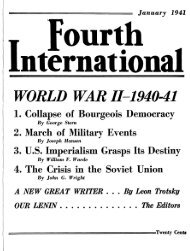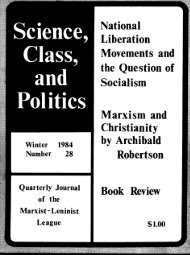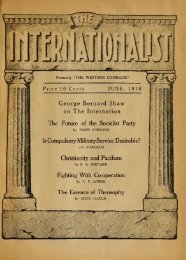The Stalin school of falsification - Marxists Internet Archive
The Stalin school of falsification - Marxists Internet Archive
The Stalin school of falsification - Marxists Internet Archive
Create successful ePaper yourself
Turn your PDF publications into a flip-book with our unique Google optimized e-Paper software.
<strong>Stalin</strong> School <strong>of</strong> Falsification -- Chapter 11<br />
those days <strong>Stalin</strong>. During the time <strong>of</strong> his modest activity in the Execu tive Committee [he] gave me the<br />
impression -- and not only more <strong>of</strong> a drab spot which would sometimes emit a dim and inconsequential<br />
light. <strong>The</strong>re is really nothing more to be said about him." (Notes on the Revointion, Bk. 2, pp. 26sf.)<br />
17. Lenin, who had finally managed to break through from abroad, raged and thundered against the<br />
"Kautskyist" Pravda (the term is Lenin's). <strong>Stalin</strong> withdrew to the side lines. At the time when Kamenev<br />
manned the defenses, <strong>Stalin</strong> remained silent. Gradually he slid into the new <strong>of</strong>ficial groove made by<br />
Lenin. But we do not find emanating from him a single independent idea or generalization on which it is<br />
worth while dwelling. Whenever the occasion arose, <strong>Stalin</strong> stepped in between Kamenev and Lenin.<br />
Let us take the most acute moment <strong>of</strong> the inner-party struggle on the eve <strong>of</strong> the October insurrection.<br />
Kamenev and Zinoviev came out in the non-party press against the insur rection. Lenin in a letter to the<br />
Central Committee branded their action as "infinitely vile," and raised the question <strong>of</strong> expelling them<br />
from the party. Lenin was particularly indig nant at the fact that in all their open declarations, Zinoviev<br />
and Kamenev, without ceasing to agitate against the insur rection, covered their violation <strong>of</strong> the decision<br />
<strong>of</strong> the party with hypocritical and diplomatic formulse. Meanwhile, on that very same day, October 20,<br />
there appeared to the astonishment <strong>of</strong> the Central Committee the following declara tion in the central<br />
organ <strong>of</strong> the party:<br />
"Statement by the Editorial Board. We on our part express the hope that the matter will be considered as<br />
closed with the statement made by comrade Zinoviev (and also comrade Kamenev's statement in the<br />
Soviet). <strong>The</strong> sharp tone <strong>of</strong> comrade Lenin's article does not alter tile fact that we are fundamentally in<br />
agreement." (Protocols <strong>of</strong> the C.C. <strong>of</strong> S.D.L.P.R., Aug. 1917 -- Feb. 1918. State Publishers, 1929, p.<br />
137.) Thus, where Lenin spoke <strong>of</strong> an "infinitely vile" behavior, covered up by diplomatic subterfuges, the<br />
edi torial board, basing itself on these subterfuges, spoke <strong>of</strong> "agreement."<br />
<strong>The</strong> editorial board consisted at the time <strong>of</strong> <strong>Stalin</strong> and Sokolnikov. "Comrade Sokolnikov announced that<br />
he had had no part in the declaration <strong>of</strong> the editorial board with regard to the letters <strong>of</strong> Zinoviev, and that<br />
he regarded this declara tion as erroneous." (Idem., p. 128.) Thus, it was made clear that <strong>Stalin</strong> on his<br />
own responsibility supported-against Lenin, against the Central Committee, and against the other<br />
member <strong>of</strong> the editorial board -- Kamenev and Zinoviev at the most critical moment, four days prior to<br />
the insurrection; and did so through an <strong>of</strong>ficial declaration which could not but confuse the entire party.<br />
<strong>The</strong>re was universal indigna tion. <strong>The</strong> protocol reads: "Comrade <strong>Stalin</strong> presents a state ment that he is<br />
withdrawing from the editorial board." (Idem., p. 129.) Rather than aggravate an already rather difficult<br />
situation, the Central Committee did not accept <strong>Stalin</strong>'s resignation.<br />
But, after all, how explain the astounding declaration <strong>of</strong> <strong>Stalin</strong> in Pravda.~ Like a number <strong>of</strong> other steps<br />
taken by <strong>Stalin</strong> during the period from April to October, the declara tion cannot be understood unless we<br />
take into consideration the fact that <strong>Stalin</strong> was under the influence <strong>of</strong> his Menshevik policy during March<br />
and the first days in April. What had occurred only yesterday was still so fresh in the minds <strong>of</strong> everyone.<br />
<strong>Stalin</strong> up to April 4 had marched so closely in step with Kamenev. <strong>The</strong> turn in party policy after April 4<br />
was so sharp that <strong>Stalin</strong> found himself all this time in a condition <strong>of</strong> acute political infirmity: he<br />
squirmed, kept mum, allowed others to commit themselves, but once in a while he would burst out<br />
against Lenin, in the spirit <strong>of</strong> the above-quoted editorial declaration.<br />
18. For a number <strong>of</strong> years, <strong>Stalin</strong> and all his Kuusinens have been broadcasting throughout the world the<br />
version alleging that Trotsky had wilfully and against the decision <strong>of</strong> the C.C. decided not to sign the<br />
peace treaty at Brest Litovsk. <strong>Stalin</strong> even undertook to prove this in the press. We have now the <strong>of</strong>ficial<br />
http://www.marxists.org/archive/trotsky/works/1937-st2/sf11.htm (8 <strong>of</strong> 12) [06/06/2002 15:07:13]

















